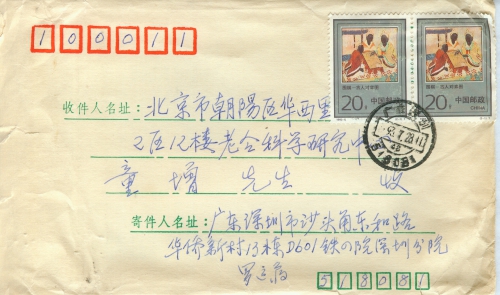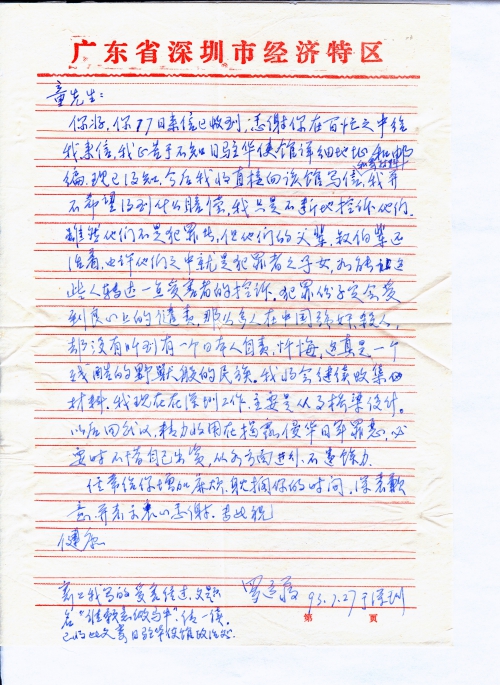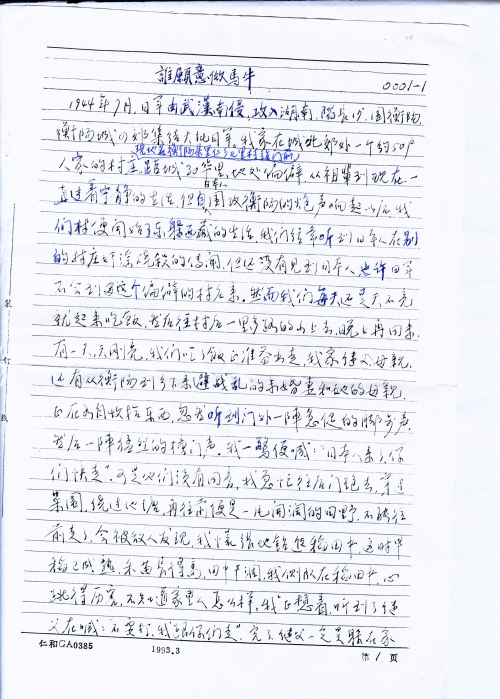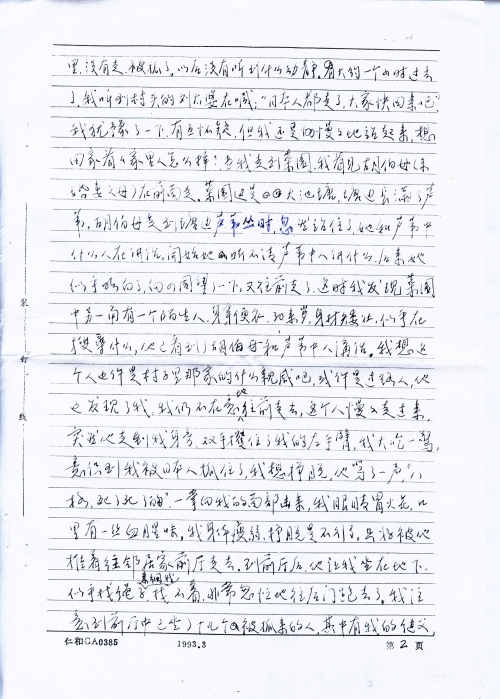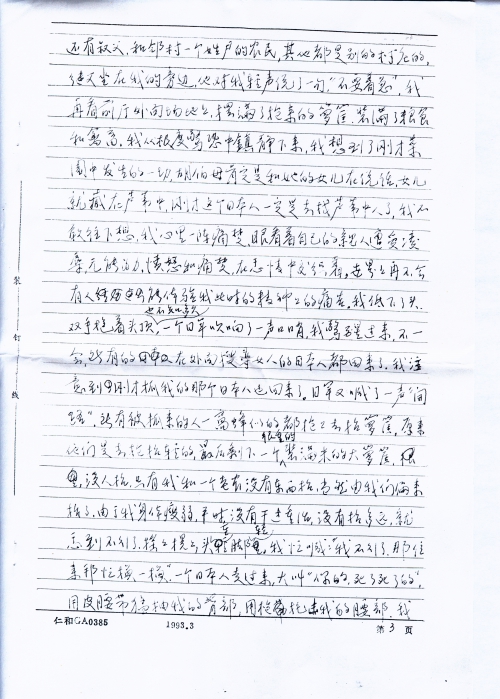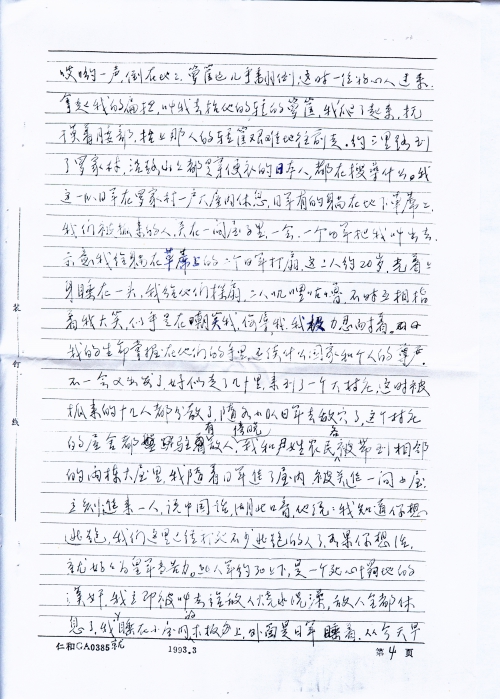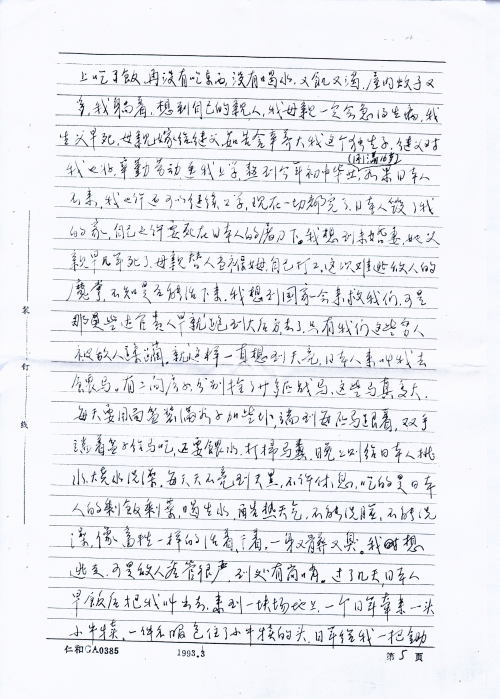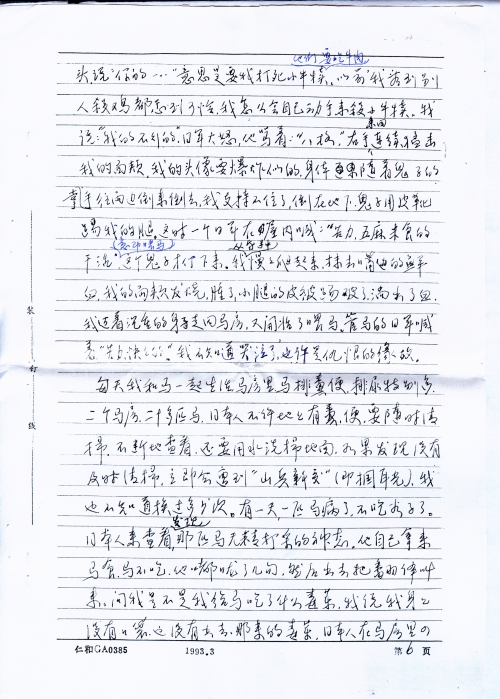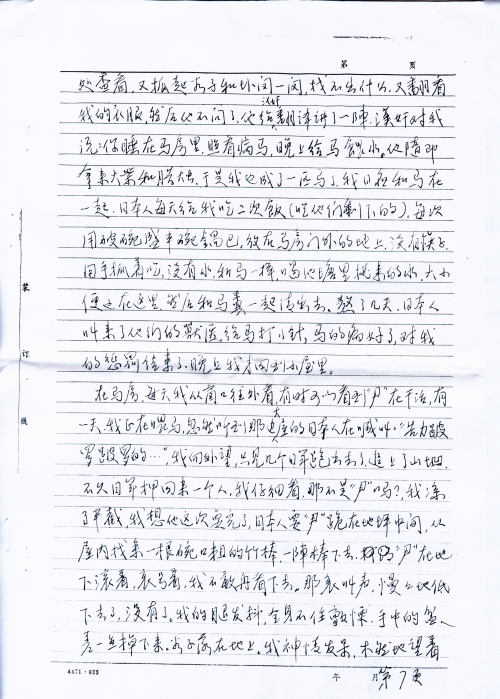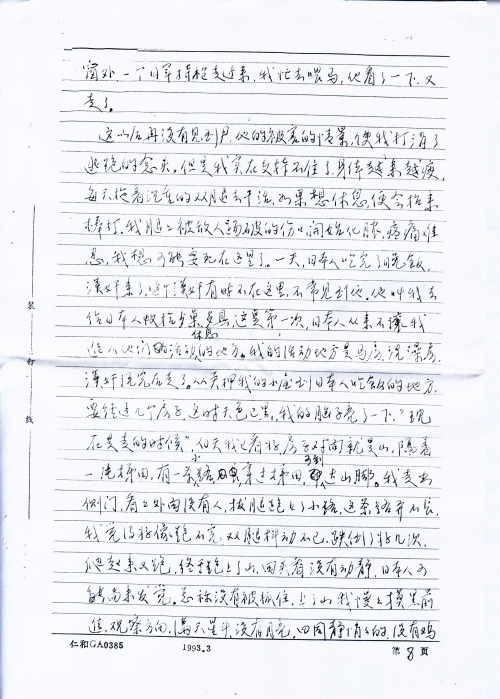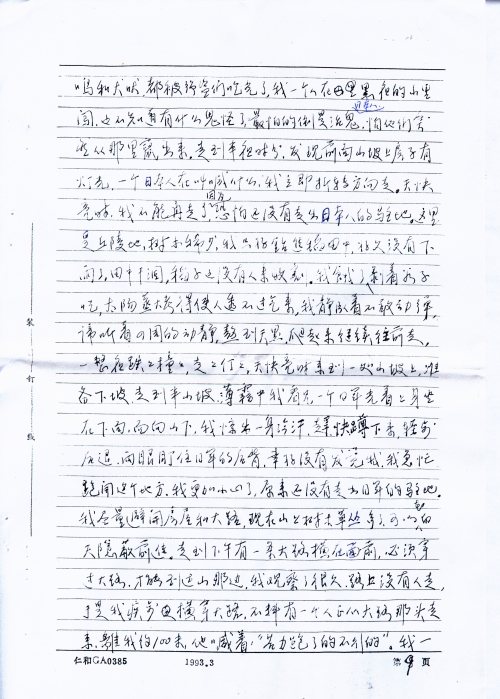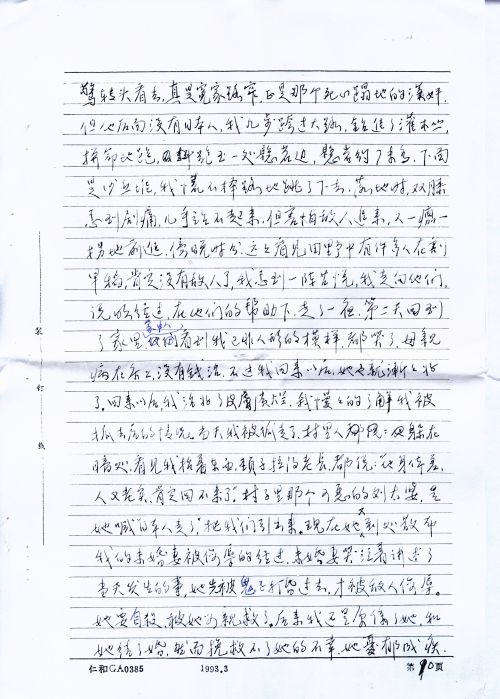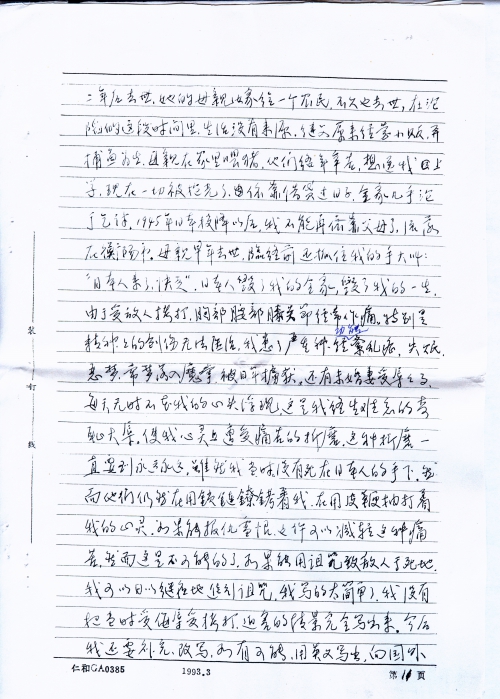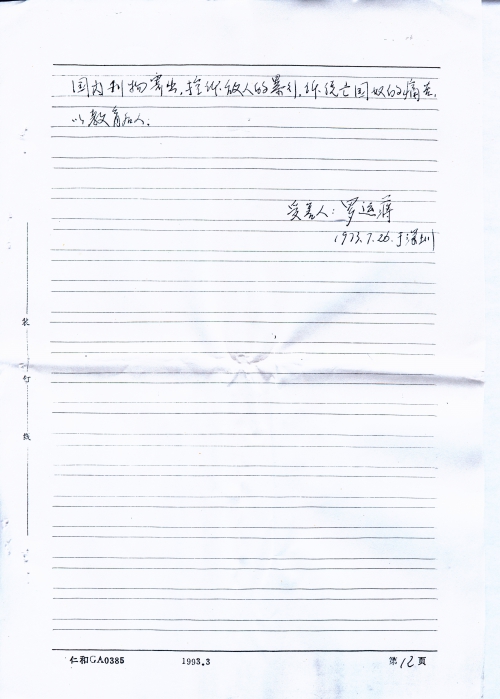Date of letter:1993-07-26
Address of author:Shenzhen City
Date of event:1944
Location of event:Hengyang City, Hunan Province
Name of author:Luo Yunjiang
Name(s) of victim(s):Luo Yunjiang
Type of atrocity:Rapes, Slave Laborers, Murders(RA, SL, MU)
Other details:In July 1944, the Japanese army invaded southward from Wuhan to enter Hunan Province. The enemy controlled Changsha first and then Hengyang. My family was living in a small village north of the city, a remote destination that we thought far from their reach. However, we got up still before dawn every day, went up the mountains to hide and then came home at night. One day we just ran into the Japanese before going out. My stepfather, uncle and I, together with a dozen villagers, were arrested. We were forced to transfer the belongings looted by Japanese to their camps and later did hard labor cooking, feeding horses while suffering from their hard beatings. During the time, those who had tried to escape but failed were eventually killed. Seeing that, I dropped the idea of escape. One evening I took the opportunity to escape and ran all night long. As the dawn fell, I dared not proceed, afraid of being caught. I hid in paddy fields to be harvested soon, feeling really hungry, and fed myself with peeled paddy. The baking sun made me breathless, but I had to wait until dark and continued running. I walked for another day to get home. My fiancée was raped by Japanese and her depression worsened into illness that led to her death two years later. I, too, had nightmares quite often.
Mr. Tong:
How are you?
I’ve received your letter of the 17th. Thank you for taking the time to write to me. I was concerned about not knowing the address and postal code of the Japanese Embassy in China. Now that you’ve told me, I can send my letters and send other materials directly to it. Though I don’t expect to get any compensation; I will never stop accusing them of the war crimes. They may not be criminals themselves, but their parents and uncles may still be alive, and they may be the children of the criminals. If I can make the Embassy convey the accusation from victims like me, the conscience of their deeds will bear on these criminals. So many Japanese soldiers have killed and raped in China, but we haven’t heard a single one of them acknowledging or confessing to what they did. How cruel the Japanese people are! I will keep collecting materials. Right now, I work on bridge design in Shenzhen. After I return to Wuhan in the future, I will devote myself to telling the crimes of the invading Japanese army and will use my own money to get the truth out if necessary.
I am always troubling you and taking your time. I am deeply sorry for that and express my sincere gratitude to you.
Wish you good health.
Attached is an article about my suffering titled “Who Wants to Be a Forced Laborer” for your reading. I’ve sent it to the Political Office of the Japanese Embassy in China.
Luo Yunjiang
July 27, 1993, Shenzhen
Who Wants to Be a Forced Laborer
In July 1994, the Japanese army invaded southern Wuhan. After occupying Hu’nan and Changsha, the army surrounded Hengyang. My family lived in a village of 50 households in the suburb of northern Hengyang (now called Qili, Lirensan, Hengyang). It was a remote place 15 km away from the city, where my ancestors lived a peaceful life. But after the Japanese attacked Hengyang, we began to live a life of hiding. We often heard rumors of the Japanese raping, burning and killing in other villages, but we hadn’t seen them and thought they might not come to our village. However, every day, we would still get up before dawn, had breakfast, then walked over 500 meters of mountainous roads to hide in the mountain and came back at night. One day at dawn, we had breakfast and were making preparations for leaving. Apart from my stepfather and mother, there were my bride-to-be and her mother who came here from Hengyang to hide from the Japanese. We were packing our stuff, and suddenly rapid footsteps came and the sound of violent knocking on the door was heard. I was startled and called, “The Japanese came. Let’s go!” But no one replied. I hurried to the back door, passed the vegetable garden, around the pool and found myself before a vast field. I dared not walk any further; otherwise I would be discovered by the enemy. I hastily hid among the rice field. The rice grew tall and the field was dry. My heart beat fast and I was wondering what happened to my family. Then, I heard my stepfather shouting, “Don’t hit me anymore. I will go with you.” My heart sank. He must be hiding in the house and got caught. Then, it was quiet for a while. About an hour later, I heard Mrs. Liu from our village shouting, “The Japanese had left. Come out everybody.” I suspected and hesitated for a moment. Then I gradually stood up and wanted to go home to check on my family. When I returned to the vegetable garden, I saw Aunt Hu (mother of my bride-to-be) walking in front. The vegetable garden was near to the big pool surrounded by reeds. When Aunt Hu walked to the seeds, she suddenly stopped and was talking to someone in the seeds. At first, she didn’t get what that person was saying. Afterward, it seemed that she understood, looked around her and continued to walk. At that time, I found a stranger at a corner of the vegetable garden, dressed in plain clothes, about 30, short and strong. He seemed to be looking for something and he had seen Aunt Hu talking to someone in the seeds. I thought he might be a relative of a villager, or a passer-by. Then, he also found me. But I still walked forward. He gradually walked over and suddenly, he approached me and caught my left arm. I was surprised and realized that I was caught by the Japanese. I tried to get away, but he cursed “Moron.” He slapped me hard. I nearly blacked out and my mouth bled. I was too weak to get away from him. He pushed me towards the door of my neighbor and made me sit on the ground in the front hall. He seemed to try to find a string to tie me but he couldn’t. Then he hurried to the back door. I noticed that there were over 10 people in the front hall, including my stepfather, uncle and a farmer surnamed Yin from our neighboring village. All the rest were from other villages. My stepfather sat next to me and whispered to me, “Don’t worry.” I looked at the ground in front of the hall. There were many baskets containing grain and livestock. I calmed myself down and thought about what happened in the vegetable garden. Aunt Hu must be talking to her daughter. She was hiding in the seeds. The Japanese man must be looking for her. I dared not think further. It was so painful to see my families suffer and couldn’t do anything about it. I was tormented by anger and pain. No one in the world knew what I was experiencing at that moment. I lowered my head into my arms. After a while, a Japanese soldier blew the whistle and woke me up. Soon later, all Japanese soldiers who were searching for women outside came back, including the Japanese soldier that caught me. The soldier shouted “Go.” All the captured men rushed to carry the baskets. The lighter ones were taken first. An old farmer and I were the last to go carry the baskets and we ended with the heavy one. As I was weak and never did heavy work before, I began to shake and feel feeble before long. I shouted, “I couldn’t do it. Who can switch with me?” A Japanese soldier came over and shouted “Moron.” Then, he whipped my back with a belt. I screamed and fell on the ground, nearly overturning the basket. Luckily, a nice man came and picked up my shoulder pole and asked me to carry his lighter basket. I climbed up to carry his basket and struggled to move forward. After walking about 1,500 meters, we reached Luojia Village. We saw many Japanese soldiers in plain clothes on the way, searching for something. The Japanese soldiers that caught us took a rest in a large house in Luojia Village. Some of them lay on the ground and some on the straw mat. We were locked in a room. A Japanese soldier came and motioned me to go outside and to fan for two Japanese soldiers lying on the straw mat. They were about 20, sleeping there half-naked. I was fanning for them; they were chatting and laughing from time to time while pointing at me. They seemed to be laughing at me and insulting me. I tried hard to endure it. My life was in their hands, let alone national and personal dignity. After a while, we set off again. After walking thousands of meters, we reached a large village, where more than 10 arrested people split up and followed their team of Japanese soldiers. Each household of the village had Japanese soldiers living in it. At night, a farmer surnamed Yin and I were taken to two adjacent big houses. I followed the soldiers in and was locked in a room. A man immediately entered, saying Japanese with a Hubei accent, “I know you want to escape, but many escapees were killed here. If you want to live, you’d better be a good laborer for the Imperial Army.” He was about 30, a traitor. I was immediately assigned to boil bath water for the Japanese soldiers. After all of the soldiers went to bed outside my room, I lay on a wooden board, thinking about my life. Apart from breakfast, I didn’t have anything to eat the whole day. I was hungry and thirsty. There were many mosquitoes flying around me. I thought about my family. My mother must be very anxious and might have become ill. After my father died early, my mother was remarried to my stepfather. They had suffered so much to bring me up. I was their only son. My stepfather was good to me. He worked hard and sent me to school. I graduated from the middle school this year (I had just turned 16). If the Japanese army didn’t come, I might have continued studying. But all was ruined. The Japanese army destroyed my family. Then, I thought of my bride-to-be. Her father died several years ago and her mother worked as a nanny. I wondered whether they survived the enemy. I thought that the government would rescue us. But the high officials had moved away from the frontline, leaving the poor people to be slaughtered and tortured by the enemy. I thought all about this until dawn. The Japanese came and told me to feed horses. There were two rooms, each accommodating over 20 tall and strong war horses. Every day, I had to feed each horse by holding a basin full of millet added with some salt with two hands. I also needed to feed them water and cleaned the horse dung. At night, we would boil and fetch water for the Japanese soldiers. I worked hard from early in the morning to late at night. I ate the leftovers of the Japanese soldiers, drank cold water and couldn’t wash my face or bathe in the hot weather. They worked me as a beast-like laborer and I smelled bad. I wanted to escape, but there were Japanese soldiers on tight watch everywhere. A few days later, after breakfast, a Japanese soldier pulled over a calf with a piece of clothes wrapped over its head and gave me a hoe, saying “yours”. He was telling me to kill the calf so they could eat its meat. But I was a person who felt sorry for chickens when watching them being killed. How could I kill a calf with my own hands? I said, “I can’t.” The soldier got furious and called me “Moron.” He slapped my face repeatedly with his right hand. I felt that my head was going to explode and my body swayed to the side with his slap. Finally, I couldn’t handle it anymore and collapsed on the ground. He kicked my leg with his leather boot. Then, another Japanese soldier called from the house, “Laborer, go and feed the horses.” The first soldier stopped kicking me. I climbed up and wiped off the blood from my mouth. My cheeks were burning and swollen, and my leg was bleeding. I walked in difficulty to the stable and began to feed the horses. The Japanese soldier responsible for managing horses shouted, “Laborer, be quick.” I couldn’t cry anymore. Maybe it was because of so much hatred.
Each day, I lived in the stable with horses. The stable was filled with dung and urine. There were over 20 horses in two stables. The Japanese didn’t allow any dung on the ground, so I had to clean up all the time and wash the ground with water. If the stable was not clean at any time, I would immediately be slapped. One day, a horse got sick and wouldn’t eat millet. The Japanese soldier came to inspect the stable and found the horse weak. He fetched the horse some feed, but it didn’t eat. He murmured something, went out and came back with the interpreter. He asked me whether I had fed the horse with poisonous vegetables. I replied, “I don’t have a pocket, and I can’t go out. How can I have poisonous vegetables?” Then, the Japanese soldier looked around the stable again and smelled the millet, but he couldn’t find anything wrong. He checked my clothes, but said nothing. Then, he said something to the interpreter (a traitor) and left. The interpreter said to me, “Take care of the sick horse in the stable and feed water to it at night.” He got some firewood and candles for me. So I became a horse too. I stayed with the horses day and night. The Japanese would send two meals (leftovers) to me each day. They would put a broken bowl on the ground outside the stable. Without chopsticks, I had to eat with hands. Without water, I had to drink from the pool like horses. And I urinated and shitted in the stable too and cleaned it away with horse dung. Several days later, the Japanese sent their veterinarian in, who gave the horse a shot. The horse was cured and my punishment ended. I finally returned to my room that night.
When I was kept in the stable, I looked outside the window each day. Sometimes, I could see farmer Yin from my village working. One day, when I was feeding horses, I heard a sudden shout from a Japanese, “A laborer ran away…” I looked outside and saw several Japanese soldiers running towards the mountain. Not long after that, they took someone back. I looked carefully and realized it was Yin. My heart sank. I worried for him. The Japanese made him kneel in the middle of the ground, fetched a big bamboo stick from the house and began to hit him. Yin rolled over on the ground, screaming loudly. I dared not look any more. His scream faded gradually until there was no more. My legs were shaking and I trembled all over, nearly dropped the basin in my hand. The millet was spilled. I looked out the window and saw a Japanese soldier holding guns walking over. I hurried to feed the horses. He looked at me for a moment and left.
I never saw Yin after that. The scene of his beating removed any idea of escaping for me, but I couldn’t take it anymore. I was getting thinner and thinner. Every day, I dragged my legs to work. If I took a rest, I would be beaten. My wound on the leg began to fester. I was in so much pain. I thought I might die there. One day after the Japanese had dinner, the traitor came. Sometimes, he wasn’t in the house, so I didn’t see him much. He asked me to clean up the table. This was the first time that I was allowed to enter the place where the Japanese took a rest. My place was the stable and bath room. The traitor said that and left. There were several houses between the room I was kept in and the place where the Japanese had meals. It was dark then. It suddenly occurred to me that it was my chance to run away. I checked the place at daylight. Opposite to the houses was a mountain. There was a small path leading to the terraces and then the mountain. I walked out of the side door and saw nobody outside. So, I ran towards the small path. The distance was not long, but it seemed I couldn’t finish it. My legs trembled and I fell over several times, but I got up and kept running. Finally, I ran up the mountain, looked back and saw no one was after me. The Japanese might haven’t noticed me missing yet. Luckily, I wasn’t caught. I gradually walked forward in the dark. The sky was dotted with stars and there was no moon. It was quiet without chicken crowing or dogs barking because they were all eaten by the Japanese army. I walked in the black mountain alone, fearing not ghosts but the living Japanese soldiers suddenly popping up. At midnight, I saw light from a house in front, but heard a Japanese shouting. So I turned around and walked backwards. At dawn, I couldn’t walk anymore because I was afraid that I was still in the area of the stationed Japanese army. The place was hilly, with few trees, so I had to hide in the rice field. It hadn’t rained for a long time. The field was dry and no one came to harvest the rice. I ate millet when I was hungry. The sun was so strong that I could barely breathe. I hid still, listening to the surrounding sound. When it was dark again, I climbed up and kept walking forward. I stumbled all the way through the night. I stopped and continued and reached a hill before dawn. Through the thin mist, I saw a half-naked Japanese soldier sitting under the hill with back towards me. I broke out in a sweat, quickly squatted down and walked backwards quietly, with eyes staring at the back of the soldier. Luckily, he didn’t notice me. I quickly ran away from the place. I had to be more careful because I was still in the area of the stationed Japanese army. I tried to avoid the houses and big roads. The mountain had many trees and grass. I could secretly move forward in the daylight. In the afternoon, I walked before a big road and must cross it to reach the other side of the mountain. I observed for a long time and didn’t see anyone on the road. So, I hurried to cross the road. Unexpectedly, someone walked out from the other side of the road, about 100 meters away from me. He shouted, “You shouldn’t run away.” I was surprised and looked over. What a small world! It was the traitor. But there were no Japanese soldiers behind him. I strode over the road, jumped in the bushes and ran like hell. I reached a cliff about 7 meters high and under it was sand. I hastily jumped down and felt much pain at my knee when I landed on the sand. I could hardly stand up. But fearing the enemies may come after me, I kept walking. At dusk, I could see many people harvesting rice in the field. I finally got away from the enemies. I felt so happy. I walked towards them and explained my experience. With their help, I walked all night and returned to my home the next day. The family cried when seeing my ghostly appearance. My mother was sick in the bed and couldn’t get treatment due to the lack of money. But after I came back, she gradually recovered. My skin disease was cured and I gradually got to know what happened after I was taken away. On the day I was captured, the villagers hiding in the dark saw me carrying a basket in difficulty. They said to each other, “He was weak and honest. He could never come back alive.” It was all the fault of the evil Mrs. Liu who shouted “The Japanese had left.” to lure us out. Now, she spread rumors of my bride-to-be being violated by the Japanese. My bride-to-be told me with tears what happened that day. She was first knocked out by the Japanese soldier and then raped. She wanted to kill herself and was saved by her mother. Later, I forgave her and married her, but her misfortune didn’t stop. She got ill from all the anxiety and died two years later. Her mother married a farmer and also died before long. During the days of Hengyang’s fall, we lived in poverty. My stepfather ran a fish business before he was taken away and my mother fed pigs at home. They worked hard to put me through school. But now all was robbed. We had to live on credit and nearly begged to live in the street. After Japan surrendered in 1945, I couldn’t depend on my parents anymore, so I settled in Hengyang City. My mother died early. At her death bed, she grabbed my hand and shouted, “The Japanese are coming. Go.” The Japanese ruined my family and my life. I have a constant pain in my chest, waist and joints from the beatings. My mental trauma cannot be cured. I suffer from a serious neurological disorder and insomnia. I often have nightmares of being captured by the Japanese army. The humiliation my wife suffered comes to my mind from time to time. This is a burning shame of my life I will never forget. It torments my spirit constantly. Although I didn’t die under the Japanese’s hands, they shackled my body with a chain and whipped my mind with a belt. Revenge might ease my pain, but it is not likely. If a curse can kill them, I will do that day and night. In fact, I wrote the whole experience too simply. I didn’t write the scene of me being insulted and tortured. In the future, I will add that and revise the article and if possible, write in English and send it to foreign and domestic publishing houses. I will keep charging the Japanese with the terrible crimes they committed and telling people of the pain a colonial slave endured to educate our future generations.
Victim: Luo Yunjiang
July 26, 1973, Shenzhen














